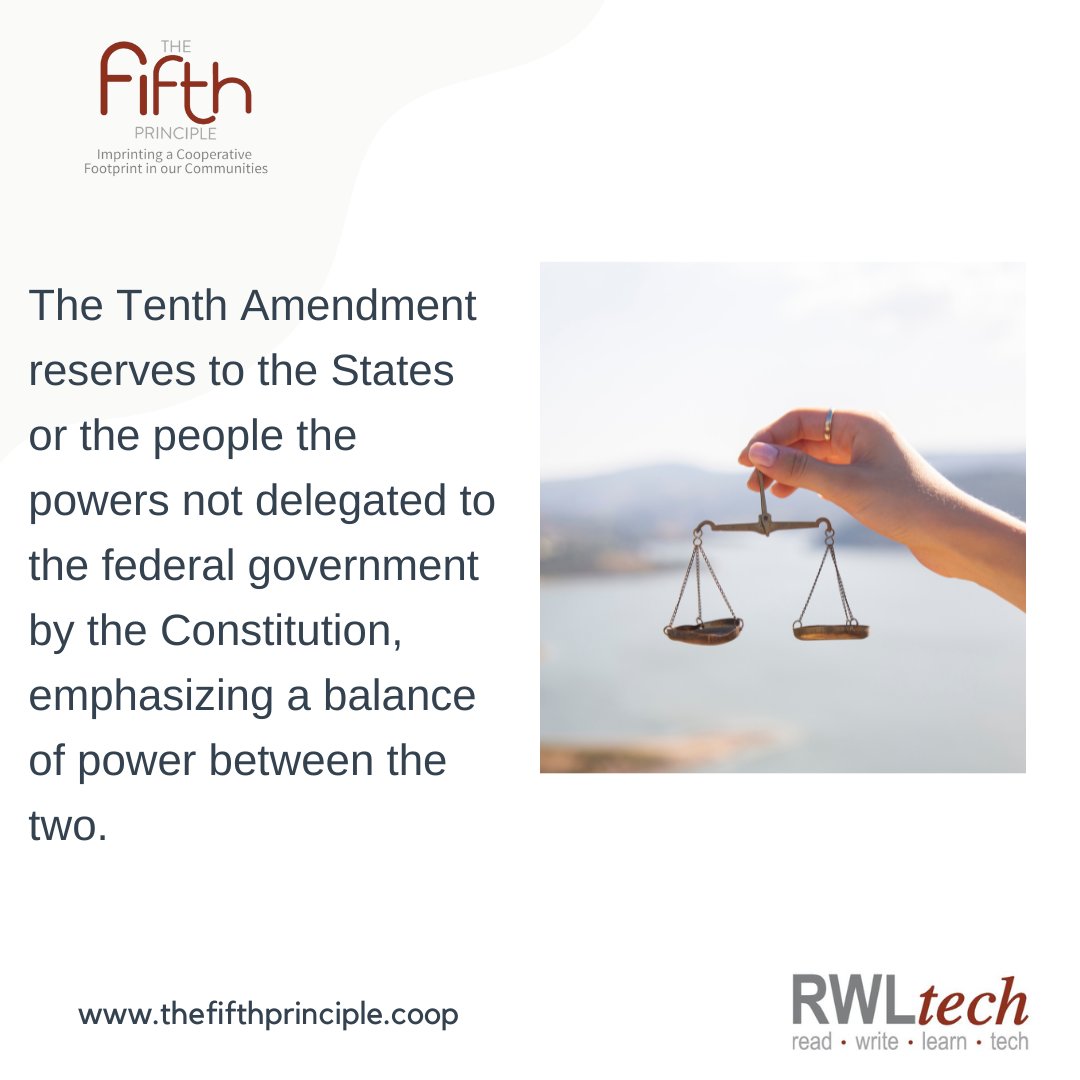The Tenth Amendment acknowledges that any authority not granted to the United States by the Constitution, or forbidden by it to the States, is retained by the States or the people. In other words, if a particular right is not expressly mentioned in the Constitution, the federal government lacks the jurisdiction to enforce it, leaving the States to determine how to address such issues according to their discretion.
(https://rumble.com/v28whic-our-founding-documents.html)
--------
Do you want to learn more about what you can do to act NOW! and save our constitution.
(https://www.thefifthprinciple.coop/wcid.html)
Take your learning to the next level:
✍️Learn about historical events that shape our future. Flashback to a Fabulous Future.
(https://www.voiceamerica.com/episode/141282/what-is-history)
✍️ Contact us to setup United States historical tours for you and/or your group.
(https://keap.page/ysn122/monument-to-our-fathers-tour.html)
✍️ Join our Constitution Alive! course beginning on March 13, 2023 at 7 pm eastern for 12 weeks. There is no charge for this course.
(https://www.patriotacademy.com/coach/register/5180)
✍️ Join our Bible Study Group. (https://keap.page/ysn122/bible-study.html) Study the Bible through the lens of our Founding Fathers. We use David Barton’s Founder’s Bible (https://thefoundersbible.com/) when we meet once a week on Sunday’s at 6:00 pm eastern. There is no charge for this class.
✍️ To join our waiting list, sign up thru the following links:
For our Biblical Citizenship, and the American Campfire Revival courses. There is no charge for these courses.
(https://www.thefifthprinciple.coop/membership.html)
#TenthAmendment #StatesRights #Federalism #ConstitutionalLaw #IndividualLiberty #BalanceOfPower #USHistory #AmericanDemocracy
The Tenth Amendment of the United States Constitution is a crucial element of the document, as it defines the balance of power between the federal government and the states. This amendment recognizes that there are certain powers that are granted to the federal government, and others that are retained by the states or the people. It establishes that any authority not specifically delegated to the federal government by the Constitution, nor prohibited by it to the States, is reserved for the States or the people. This means that the federal government has limited powers and cannot exert control over matters that fall outside the scope of its authority.
The Tenth Amendment's emphasis on states' rights has been a topic of controversy throughout American history. Some have argued that it promotes an overly decentralized government, while others believe that it provides important protections for individual liberty. The amendment has played a pivotal role in shaping the political landscape of the United States, particularly during times of great social and political change. For example, during the Civil Rights Movement of the 1960s, the Tenth Amendment was cited by some states to resist federal efforts to desegregate schools and public facilities. Conversely, the amendment has also been invoked by states seeking to challenge federal policies that they perceive as infringing upon their sovereignty, such as environmental regulations or healthcare reform.
Despite its contentious history, the Tenth Amendment remains a critical part of the United States Constitution. It reflects the Founding Fathers' belief in a balance of power between the federal government and the states, and reinforces the idea that individual liberties and states' rights are essential components of American democracy. As the country continues to grapple with issues of federalism and centralized power, the Tenth Amendment will undoubtedly continue to be a source of debate and discussion for years to come.
People
Circles
Posts
Videos
People
Circles
Videos
Posts
The Tenth Amendment acknowledges that any authority not granted to the United States by the Constitution, or forbidden by it to the States, is retained by the States or the people. In other words, if a particular right is not expressly mentioned in the Constitution, the federal government lacks the jurisdiction to enforce it, leaving the States to determine how to address such issues according to their discretion.
(https://rumble.com/v28whic-our-founding-documents.html)
--------
Do you want to learn more about what you can do to act NOW! and save our constitution.
(https://www.thefifthprinciple.coop/wcid.html)
Take your learning to the next level:
✍️Learn about historical events that shape our future. Flashback to a Fabulous Future.
(https://www.voiceamerica.com/episode/141282/what-is-history)
✍️ Contact us to setup United States historical tours for you and/or your group.
(https://keap.page/ysn122/monument-to-our-fathers-tour.html)
✍️ Join our Constitution Alive! course beginning on March 13, 2023 at 7 pm eastern for 12 weeks. There is no charge for this course.
(https://www.patriotacademy.com/coach/register/5180)
✍️ Join our Bible Study Group. (https://keap.page/ysn122/bible-study.html) Study the Bible through the lens of our Founding Fathers. We use David Barton’s Founder’s Bible (https://thefoundersbible.com/) when we meet once a week on Sunday’s at 6:00 pm eastern. There is no charge for this class.
✍️ To join our waiting list, sign up thru the following links:
For our Biblical Citizenship, and the American Campfire Revival courses. There is no charge for these courses.
(https://www.thefifthprinciple.coop/membership.html)
#TenthAmendment #StatesRights #Federalism #ConstitutionalLaw #IndividualLiberty #BalanceOfPower #USHistory #AmericanDemocracy
The Tenth Amendment of the United States Constitution is a crucial element of the document, as it defines the balance of power between the federal government and the states. This amendment recognizes that there are certain powers that are granted to the federal government, and others that are retained by the states or the people. It establishes that any authority not specifically delegated to the federal government by the Constitution, nor prohibited by it to the States, is reserved for the States or the people. This means that the federal government has limited powers and cannot exert control over matters that fall outside the scope of its authority.
The Tenth Amendment's emphasis on states' rights has been a topic of controversy throughout American history. Some have argued that it promotes an overly decentralized government, while others believe that it provides important protections for individual liberty. The amendment has played a pivotal role in shaping the political landscape of the United States, particularly during times of great social and political change. For example, during the Civil Rights Movement of the 1960s, the Tenth Amendment was cited by some states to resist federal efforts to desegregate schools and public facilities. Conversely, the amendment has also been invoked by states seeking to challenge federal policies that they perceive as infringing upon their sovereignty, such as environmental regulations or healthcare reform.
Despite its contentious history, the Tenth Amendment remains a critical part of the United States Constitution. It reflects the Founding Fathers' belief in a balance of power between the federal government and the states, and reinforces the idea that individual liberties and states' rights are essential components of American democracy. As the country continues to grapple with issues of federalism and centralized power, the Tenth Amendment will undoubtedly continue to be a source of debate and discussion for years to come.


